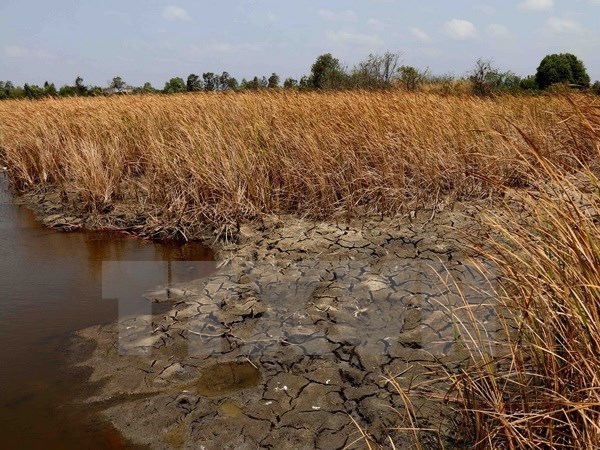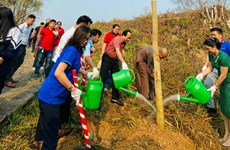Experts seek solutions to water resources exhaustion
Water supply experts have emphasised the need to deal with water issue in the entire Mekong River basin that comprises six countries along the river in order to ensure the sustainable use.
 Illustrative image (Source: VNA)
Illustrative image (Source: VNA)This will help tackle water problems in the Mekong Delta region that has seriously hit by drought and saltwater intrusion recently, they said at a conference in HCM City on November 10 to seek measures for sustainable water supply amidst climate change, water resources degradation, drought and salinity.
Nguyen Van Nghia, head of the Water Resources Department under the Ministry of Natural Resources and Environment, held that it is crucial to boost cooperation in the equal and reasonable use of shared water resources in the six Mekong countries, ensuring that the use of water in any country will not affect others as stated in the Convention on the Non-Navigational Uses of International Watercourses.
Many experts shared Nghia’s views, saying that it is necessary to mobilise national resources to convince countries with massive hydropower reservoirs to cooperate in discharging water to the lower basin, thus maintaining the minimum flow of the river at a reasonable level.
At the same time, Nghia also called on relevant ministries, sectors and localities to build and implement water resources planning for the Mekong Delta region amidst climate change and impacts of water exploitation of countries in the upper stream of the Mekong River.
The exploration of underground water resources for people in areas affected by frequent salinity is urgent, he said, suggesting the building of underground water works serving locals’ daily activities and production as well as responding to devastated saltwater intrusion.
Meanwhile, Phan Thi My Linh, Deputy Minister of Construction, revealed that her ministry has coordinated with the World Bank in researching water supply projects in order to clarify the real situation and demand for water in the region and put forth solutions.
Linh noted that climate change has resulted in a drop of 1.5-4.8 percent of the global economy. Vietnam is one of the 10 countries hardest hit by climate change, she said, adding that 70 percent of the country’s population will be affected by drought, flood and salinity.
She stressed that the Mekong Delta region is the most vulnerable to climate change, especially sea level rise.
According to the Water Resources Department, the Mekong Delta region is depending on water resources from the outside, which are declining due to El Nino, saltwater intrusion and climate change.
The region has experienced a sharp drop of rainfall. In the 2015-2016 dry season, the rainfall level was lower than the historical level by 0.2-0.4m, while salinity was much higher than the average level of many years. A salinity of 4 gram per litre intruded 45-65km of Tien River and 55-60km of Hau River and 60-65km of Cai Lon River, said the department.
In addition, climate change has caused floods in the upper Mekong Delta and drought in the centre of the region. Meanwhile, coastal areas have also suffered from sea level rises that ravage agricultural production, especially rice cultivation, it added.-VNA













